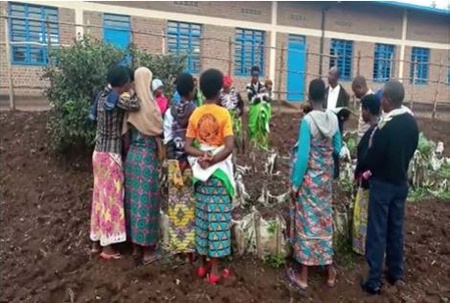A five year international development research project led by the University of Aberdeen has successfully trialled a new social practices approach to teaching which is helping improve adult literacy in Rwanda.
Researchers from the University of Aberdeen worked with the Institute of Policy Analysis and Research in Rwanda, the University of Rwanda’s College of Education and three Teacher Training Colleges across Western Rwanda to develop, implement and embed a social practices approach for adult literacy education that can be delivered by local institutions effectively and affordably.
Only 10% of adults in the target areas had attended an adult literacy course with just 14% of those finding they had gained the skills they hoped they would. Of these adults, 66% still could not read, 76% could not write and 93% could not do simple calculations.
Research shows that adult learners are generally poor and must prioritise earning a living, with many deterred from taking classes due to their time, location or lack of basic teaching and learning materials. While most of those who are illiterate are women and people living in rural areas, men are less likely to attend adult literacy classes.
“Literacy is a human right and essential for people’s quality of life. It plays an important role in reducing poverty, improving health and increasing participation in community development,” said Professor Pamela Abbott, Chair at the School of Education and Director of the Centre for Global Development.
“Those who are illiterate are excluded from mainstream socio-political and certain forms of informal employment opportunities, so addressing adult literacy is central to the Rwanda Government’s policies. There is, however, poor provision of adult education due to a lack of training for adult literacy tutors, limited funding and a dominant use of a teacher-centred approach for adult learners.”
The multi-year project explored an alternative learner-focused, social practices approach with people in the Rusizi, Karongi and Rubavu districts, adapting the existing adult education curriculum to empower adult learners to identify the issues that matter to them and develop the relevant knowledge and skills which can be applied in their daily lives.
It used techniques including role playing, group activities, case studies and problem solving to help participants see learning as practical and purposeful in relation to their everyday lives and livelihoods.
“What we found was learners recorded a wide range of improvements including increased understanding of nutrition and hygiene, healthier children and improved household incomes, which enabled them to save and pay health insurance,” added Professor Abbott.
“They also reported benefits such as understanding, for example, the importance of managing a kitchen garden and how to keep animals, or becoming community leaders. Vitally, the adult learners retained the knowledge and skills they developed during the classes and continued to use this to improve their quality of life.”
As a result of the project, five academics at the University of Rwanda’s College of Education have been trained in the new approach, with the development and roll out of a new Continuing Professional Development Diploma being used to train education officials working with the voluntary community tutors at the forefront of delivering classes to over 17,000 adult learners in both the Western and Southern provinces.
In their final report, ‘Fostering a social practices approach for adult literacies to improve people’s quality of life in Rwanda’, the team set out a number of recommendations for policy makers to scale up and sustain the provision of adult education nationally.
These include training more community education tutors and making the role salaried to increase delivery, as well as running an awareness-raising programme to improve take-up of literacy education among males.
The report also recommends the development of a national teaching qualification for the tutors, underpinned by an apprenticeship model, and that Teacher Training Colleges take on the responsibility of training them; as well as the establishment of adult education centres within existing primary schools to delivery classes in the afternoon, evening or weekend to suit the availability of adult learners.
“Our recommendations support the Rwandan Adult Basic Education Policy and Strategy,” added Dr Peter Mtika, Senior Lecturer at the School of Education.
“Vitally, they also provide effective and affordable ways of improving adult literacy and changing the lives of people in the region for the better.”
The project was funded by the Scottish Government for over £1.4 million under its Scotland Rwanda Development Programme 2017-2023.


